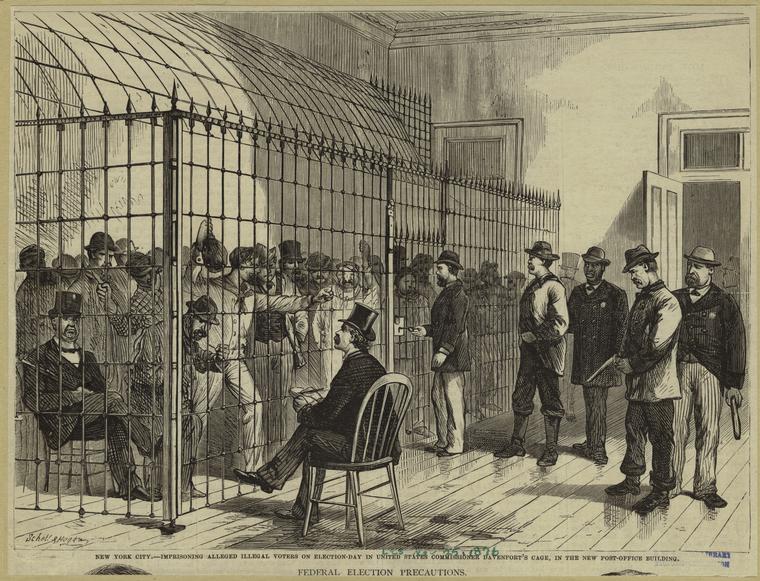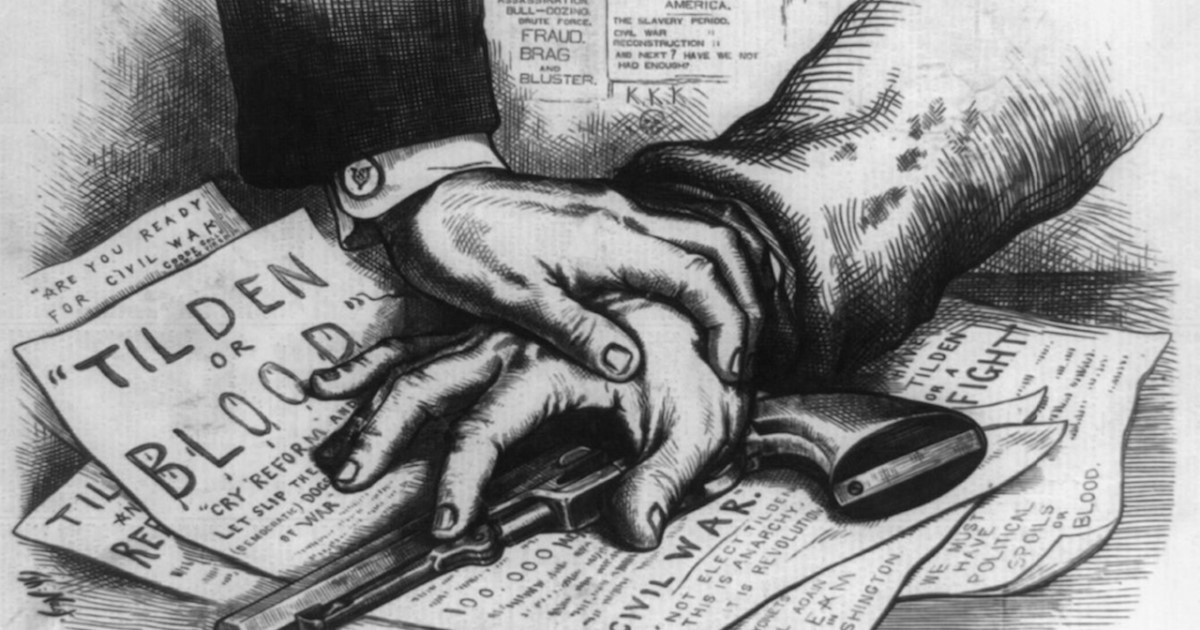
When Democrats Were Violent Election Deniers
The reaction of Trump and his loyalists to losing the 2020 presidential election was namby-pamby compared to how Democrats reacted to losing the 1876 election.
By Craig J. Cantoni – July 20, 2023
Estimated Reading Time: 4 minutes
History not only repeats itself but reveals how the Democrat and Republican parties have switched roles over time. What each one accuses the other of doing, each has done the same. Refusing to accept the results of a presidential election is one example.
Donald Trump and his loyalists refused to accept the results of the 2020 presidential election, claiming that there was massive vote fraud. One hundred years after the Declaration of Independence, Democrats claimed the same about the presidential election of 1876. They resorted to violence and almost tore the nation apart.
In the 1876 election, Ohio Governor Rutherford Hayes, a Republican, ran against New York Governor Samuel Tilden, a Democrat.
Tilden won the popular vote by a margin of over 250,000, but with the electoral votes of three states still outstanding, he was one electoral vote shy of winning the Electoral College. He had 184 electoral votes to Rutherford’s 166.
The three outstanding states were Florida, South Carolina and Louisiana. If they went for Tilden, the Democrat would win by a comfortable margin. If they went collectively for Rutherford, the Republican would eke out a victory.
A bitter, no-holds-barred battle ensued over vote counting in these three states and lasted an agonizing four months. The popular vote was so close in the three that a swing of a few hundred votes could determine the winner.
As a holdover of Republican policies, Reconstruction was still in force in the three states, with federal troops stationed in them to protect the voting rights and safety of former slaves, who had a large voting majority in S. Carolina and were a large Republican voting bloc in Florida and Louisiana.
Reconstruction and the corresponding federal troops throughout the former Confederacy had had a tremendously positive effect on blacks, with many being elected to various offices and starting businesses and schools. But the bloodshed and cost of the Civil War had made Americans weary of maintaining high troop levels in the South.
This was a tragedy that still resonates today. Reconstruction had demonstrated that blacks suffering from the horrors of slavery could advance politically and economically on their own if their rights were protected. If Reconstruction hadn’t ended too early, far fewer blacks would have later needed the paternalism of the welfare state and been treated as helpless children by condescending whites, a condescension that continues today.
In the battle over the 1876 election, Democrats in Florida, S. Carolina and Louisiana resorted to murder and other violence in spite of the presence of federal troops. The targets were Republican blacks and whites. For example, in Ellenton, S. Carolina, an estimated 500 armed whites had threatened to kill or whip blacks if they voted Republican.

President Grant sent additional troops to the three states to maintain order. And in response to rumor that Washington, D.C., was going to be attacked by a Democrat militia, he beefed up security at the city’s bridges and arsenal. In addition, he sent official observers to monitor the vote count in the three states, especially in jurisdictions where Democrats had engaged in vote fraud.
When the votes were finally tallied and submitted to Congress, Hayes ended up winning the Electoral College by one vote. Democrats responded by submitting to Congress a different set of electors, who of course claimed that Tilden had won.
In a precursor to what is known today as the Jan. 6 attack on the Capitol, a Democrat congressman in early January 1887 called for one hundred thousand Democrats to rally in Washington for Tilden’s inauguration. The publisher of the New York World, Joseph Pulitzer, urged them to come “fully armed and ready for business.”
Eventually, a group of Republicans and Southern Democrats met at Wormley’s Hotel to try to reach a compromise. The hotel was considered one of the best in Washington and patronized by the wealthy and powerful. The owner was James Wormley, a noted black entrepreneur and the son of a freeborn couple.
Democrats finally agreed to accept Hayes as president if he would end Reconstruction and withdraw troops from Florida, Louisiana and S. Carolina. The agreement came to be known as the “Wormley Compromise,” which was rich with irony considering the race of James Wormley. The compromise would pave the way for Jim Crow and an emboldened KKK.
Much of the foregoing comes from the fascinating book, An Assassin in Utopia, by Susan Wels. The book details the political and social upheavals that led to the murder of President Garfield in 1881.
Garfield’s assassin had been expelled from the Oneida Community, which was a utopian experiment, or cult if you will, in Upstate New York. It was one of hundreds of such idealistic communities in the nation in the nineteenth century. Like many of them, Oneida established a collective enterprise and upended the traditional norms about sex and family, with the top guy (the alpha male?) setting the rules about sex, with him benefiting the most. Based on the idea of free sex, men and women were discouraged from making commitments with one partner and, instead, to have sex with anyone at any time. Children in turn were raised by the collective.
Of course, experiments based on the bending of human nature never last, but this hasn’t stopped the experiments. Similar social and sexual arrangements were adopted by Jim Jones and his People’s Temple, by David Koresh and his Branch Davidians, and by Charles Manson and his “family.” Likewise, free love was one of the foundational tenets of the hippie and flower child movement of the sixties and early seventies. And it’s not a stretch to draw parallels with modern welfare policies and cultural norms that have given rise to single-parent families and to such an acceptance of promiscuity that “baby momma” and “baby daddy” are part of today’s lexicon, with awful consequences for children and men and women, but for women more than men.
A closing warning for Republicans: Be careful about lambasting Democrats for being the party of Jim Crow and other forms of racism, based on their despicable actions in the nineteenth century and much of the twentieth. Another fact of history is that many Southern Democrats moved to the Republican Party in reaction to President Johnson’s Great Society. At the same time, most blacks moved to the Democrat Party.
Remember, history repeats itself and the two parties switch roles. No doubt, this will continue as long as the U.S. exists.
